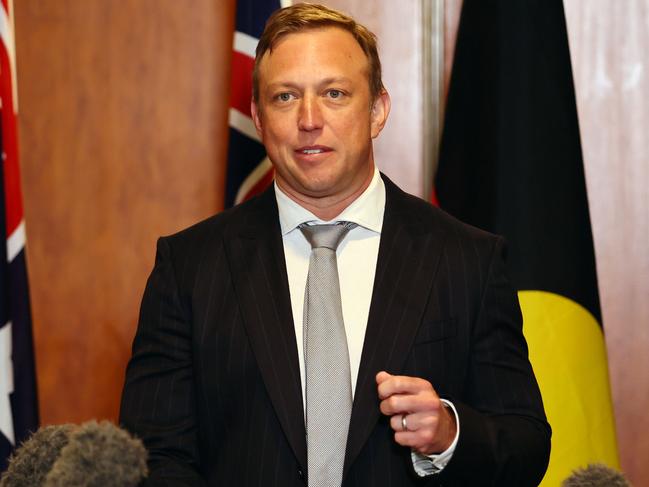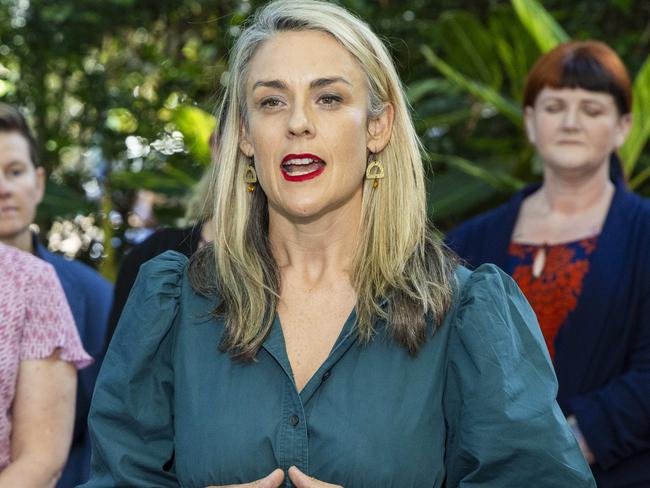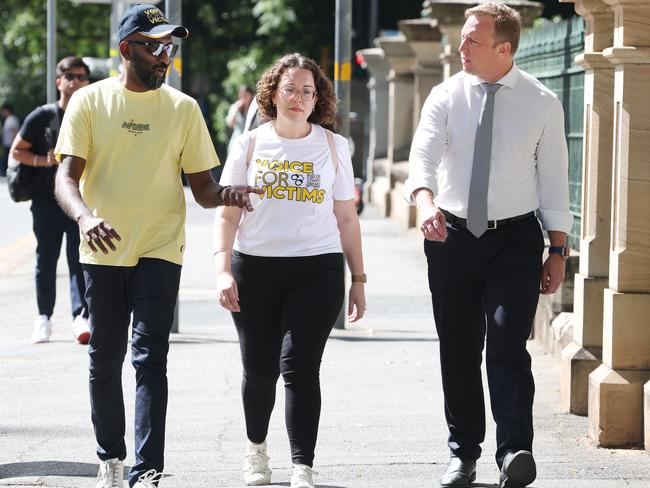Premier buckles to pressure, removes detention as a last resort
Steven Miles has revealed plans to axe “detention as a last resort”, triggering backlash from leading advocates. Was it the right move? VOTE NOW
QLD Politics
Don't miss out on the headlines from QLD Politics. Followed categories will be added to My News.
Leading advocates have slammed Premier Steven Miles’s decision to remove the “detention as a last resort” clause amid poor electoral prospects and mounting criticism the government is soft on crime.
Conceding to demands from regional MPs facing a wipe-out at the October election, Mr Miles convened a late-night Labor caucus meeting on Tuesday to reveal he would introduce amendments to parliament to axe detention as a last resort to remove any doubt when a young person should be detained.
The LNP has put the inclusion of detention as a last resort at the centre of its attacks on Labor, arguing young offenders were being kept out of detention because of it.
Mr Miles will replace the principle with a new clause, which notes: “A child should be detained in custody, where necessary, including to ensure community safety”.
Mr Miles acknowledged last week’s polling showed him on a path to defeat, but declared it was not surprising and insisted he’d keep working.
The state government has resisted removing detention as a last resort, but Mr Miles on Tuesday told The Courier-Mail doing so would make Queenslanders feel safe.
“We’ve seen a lot of misrepresentation and confusion suggesting that the courts are unable to impose detention,” he said.
“I am concerned that the existing wording of the principle is undermining confidence in the laws and the courts.
“While prevention and intervention are essential, there are cases where detention is necessary for community safety.
“These changes will remove any doubt that detention should be used in those circumstances.”

Queensland Council of Social Service chief executive Aimee McVeigh said the removal of detention as a last resort from the Youth Justice Act is an “irresponsible smokescreen because Queensland already detains more children than any other jurisdiction in Australia”.
“While our watch houses are full of children as young as 10, we have the highest rate of recidivism. Children are being jammed into crowded cells and experiencing appalling treatment,” Ms McVeigh said.
Ms McVeigh said the evidence showed that detaining young children was likely to lead to further offending.
“This is just our wannabe macho men having a fight over who can be the toughest when actually what we need are some cool heads who are willing to explain to the community the facts about what’s happening in our society and the things that will actually go towards address violence,” she said.
Youth Advocacy Centre chief executive Katherine Hayes said the government and the Opposition were “purely responding to political need” and neither were addressing community safety nor making Queenslanders safer.
Justice Reform Initiative executive director Mindy Sotiri smashed the government’s “punitive approach” to address crime.
“Removing detention as a last resort is ineffective at deterring crime and does nothing to improve community safety in the long term,” she said.
“It will only fuel the current approach of both sides of politics in Queensland, which already funnels far too many children into detention centres and adult watch houses.
“The Community Safety Plan is another expensive step in the wrong direction.”

The new clause will read “A child should be detained in custody, where necessary, including to ensure community safety, where other non-custodial measures of prevention and intervention would not be sufficient, and for no longer than necessary to meet the purpose of detention”.
The existing clause in the Youth Justice Act states “A child should be detained in custody for an offence, whether on arrest, remand or sentence, only as a last resort and for the least time that is justified in the circumstances”.
The rewording of the clause is designed to make it clear when a young person should be detained in custody.
It is understood the government sought legal advice from the Solicitor-General and Crown Law, including into whether the changes meant Queensland was still adhering to its obligations under international law.
The back and forth between the government and its lawyers has lasted nearly three weeks, with legislation understood to have been drafted as late as Monday — which is why Labor caucus could not be presented with the changes at its regular meeting.
Stakeholders, including the heads of the state’s relevant courts, were understood to have been briefed late on Tuesday.
Appearing on Sky News on Wednesday morning, Mr Miles repeatedly refused to be drawn on whether the policy had been a failure.
The premier said he decided to remove detention as a last resort following feedback during five months in the top job.
“It’s my responsibility now that I am the premier to ensure that our laws and our plans respond to what Queenslanders want to see,” he said.
“What I have heard from Queenslanders is that form of words, that policy was causing them to lose confidence in the law and in the courts.
“I’m determined to make sure that the law is crystal clear.”
“I have seen no evidence of any integrity or moral guidance provided by the government to solving the crime situation,” she said.
It capped a chaotic day in parliament in which the state government released its Community Safety Plan for Queensland, which included new discretionary powers for police to conduct public weapons searches, an expansion of the GPS monitoring program and better access to proceedings in the Children’s Court.
As part of the new legislation to be introduced on Wednesday, police will be authorised to conduct wanding at stadiums, entertainment venues, licensed premises and high-risk retail outlets including McDonald’s and service stations.
Legislative changes will see juvenile offenders “streamlined” into adult custody once they reach 18 years of age and increased penalties for dangerous operation of a vehicle and public knife possession.
Police will get a $19m boost for 5400 new tasers, 3000 metal detecting wands and 4500 body worn cameras.
Prior to Mr Miles’s late-night decision, Opposition Leader David Crisafulli demanded the government remove detention as a last resort – arguing Queenslanders were “living with” Labor’s bad decision.
“How hard is it for a government to say sorry and admit they got it wrong?” he said.
“Victims want it removed, frontline police want it removed, we even know some members sitting opposite of us want it removed.”
Mr Miles acknowledged more needed to be done to address crime rates around the state and Labor’s focus had been practical measures proven to work.
“Things like more police … helicopters and other tools, equipment and resources for our police,” he said.

“So many agencies have a role to play in community safety, and this consolidated comprehensive plan brings those efforts together and ensures everyone in government is pulling in the same direction.”
Amid criticism of the government’s efforts in attracting police, Queensland Police Service Commissioner Steve Gollschewski said the recruitment pipeline was “looking very strong”.
“We have over 600 people in the academy now and we’ll continue to do that and so we’ll be putting more police out but we need to get them out and working in communities to provide those services that will keep the community safe.”
Peakcare Queensland chief executive Tom Allsop slammed the government’s crime plan, saying it was full of “glaring omissions” and the government had missed a key opportunity to “actually make a difference in addressing drivers of crime”.
“Investing in more of the same hasn’t worked so far and it won’t work now,” he said.
“Being tough on crime gives you optics. Being tough on the causes of crime gives you safety. This plan does not.”
The community safety plan will deliver an additional $1.28bn funding injection towards crime prevention including $261.4m towards a new “therapeutic operating” youth detention centre at Woodford made up of 80 “homelike” cell units at about $7.8m each.
The model is aimed at rehabilitating youth reoffenders with the $627.6m centre expected to be complete in 2026.
Another proposed youth detention facility in Cairns — set to have 40-beds — won’t be ready until some stage in 2027.




